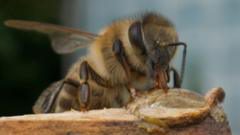
Scientists make 'superfood' that could save honeybees
We rely on honeybees to pollinate our crops and a new food could protect them from growing threats.

We rely on honeybees to pollinate our crops and a new food could protect them from growing threats.
Scientists have developed a new "superfood" aimed at enhancing the survival of honeybee populations, which are crucial for agricultural pollination. This innovative approach comes at a time when honeybees face numerous threats, including habitat loss, pesticide exposure, and diseases. The food is designed to bolster the bees' immune systems and overall health, potentially mitigating the alarming decline in their numbers observed over recent years.
The significance of honeybees in global agriculture cannot be overstated. They are responsible for pollinating a substantial portion of the fruits, vegetables, and nuts consumed worldwide. According to estimates, about one-third of the food we eat relies on pollination, primarily by bees. In recent decades, however, bee populations have been dwindling, prompting concerns among scientists, farmers, and policymakers alike about the long-term implications for food security and biodiversity.
Researchers behind the superfood have focused on creating a nutrient-rich formula that addresses specific deficiencies in the bees' diets, particularly in areas where natural forage is scarce. This new supplement includes essential vitamins, minerals, and fatty acids that are often lacking in traditional bee feed. The aim is to provide a more balanced diet that can enhance bee resilience against diseases and environmental stressors.
### Addressing the Decline in Bee Populations
The development of this superfood is a response to the alarming trends in bee mortality rates. Recent surveys have indicated that many beekeepers have experienced significant losses, with some reporting that up to 40% of their colonies did not survive the winter months. Factors such as climate change, the proliferation of invasive species, and increased pesticide use have all contributed to the precarious state of bee populations.
In addition to the direct benefits of the superfood, researchers see this as part of a broader strategy to promote healthy ecosystems. By improving bee health, the hope is that it will also lead to increased pollination efficiency and crop yields. This could be particularly beneficial for farmers who depend on bees for pollination, as healthier bee populations may result in better harvests and reduced reliance on chemical pesticides.
### Potential Impact on Agriculture and Ecosystems
The introduction of this superfood for honeybees could have far-reaching implications for both agriculture and natural ecosystems. As bee populations stabilize and grow, the benefits could cascade throughout food systems, enhancing the availability of various crops. Furthermore, thriving bee colonies can support other wildlife, promoting biodiversity and healthier ecosystems.
The research team is currently conducting trials to assess the effectiveness of the superfood in real-world conditions. Early results have shown promising improvements in bee health, but ongoing studies will be essential to determine the long-term impacts. Should these trials prove successful, the researchers plan to collaborate with agricultural stakeholders to facilitate large-scale production and distribution of the superfood.
The development of this innovative food comes at a critical juncture in the fight to protect honeybees. As awareness of their plight grows, initiatives aimed at conserving bee populations are gaining momentum. Community engagement, educational programs, and policy changes are also increasingly being advocated to address the multiple threats bees face.
In conclusion, while challenges remain, the introduction of this superfood represents a hopeful advancement in the effort to protect honeybees. As researchers continue to refine their approach and gather data, the agricultural community and environmental advocates are closely watching for results that could shape future conservation strategies. The success of this initiative may not only safeguard bee populations but also reaffirm the interconnectedness of human food systems and natural ecosystems, highlighting the need for continued investment in environmental health.
This development invites discussion on what more can be done to support pollinators and ensure sustainable agricultural practices moving forward.